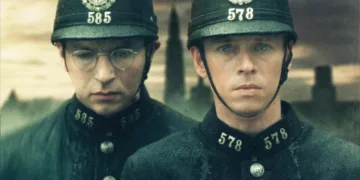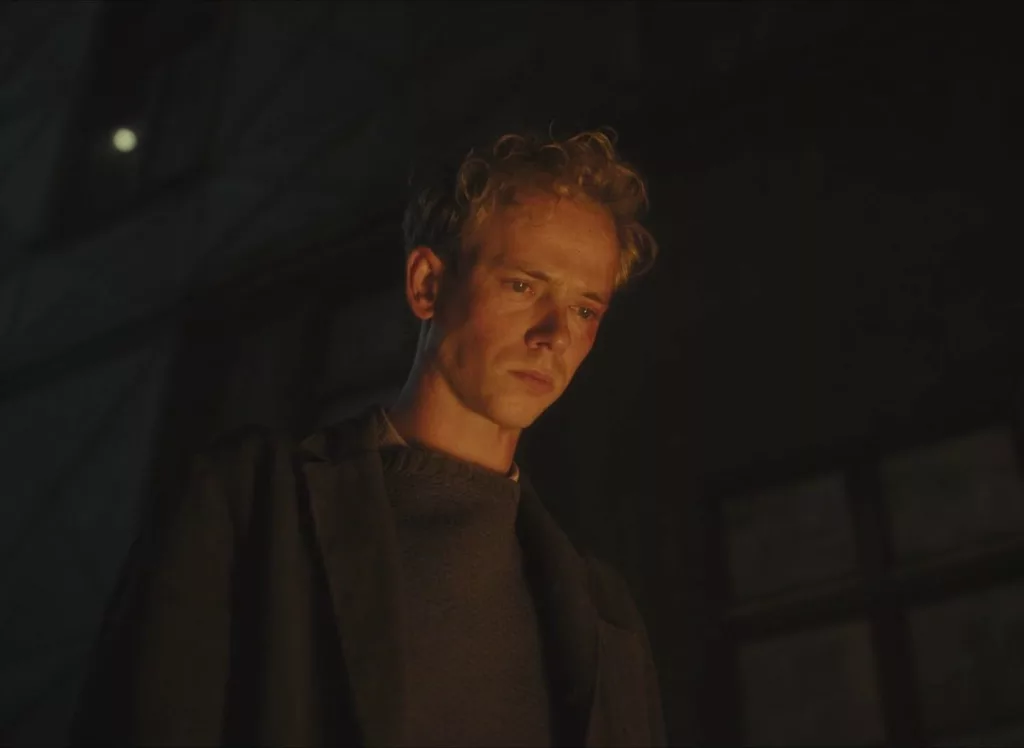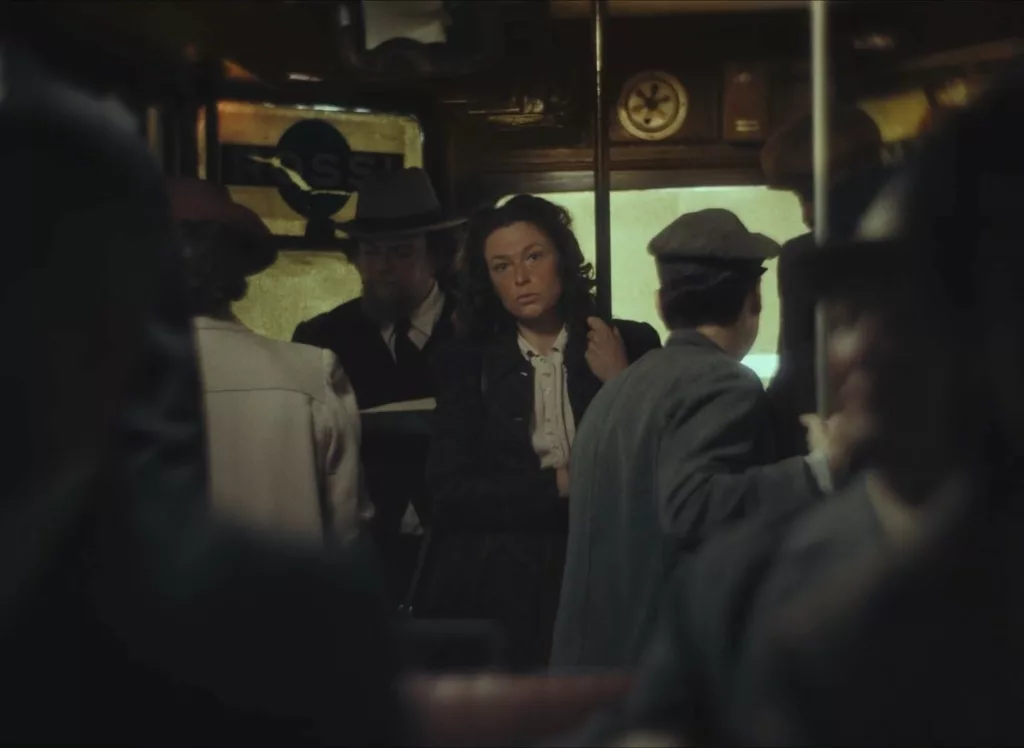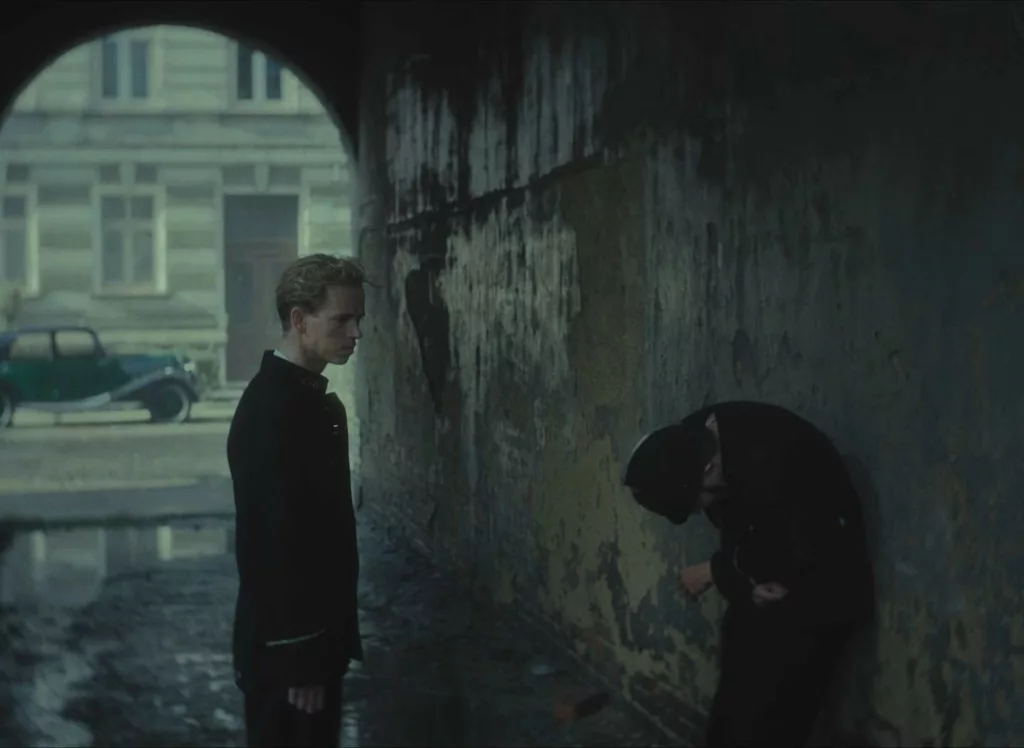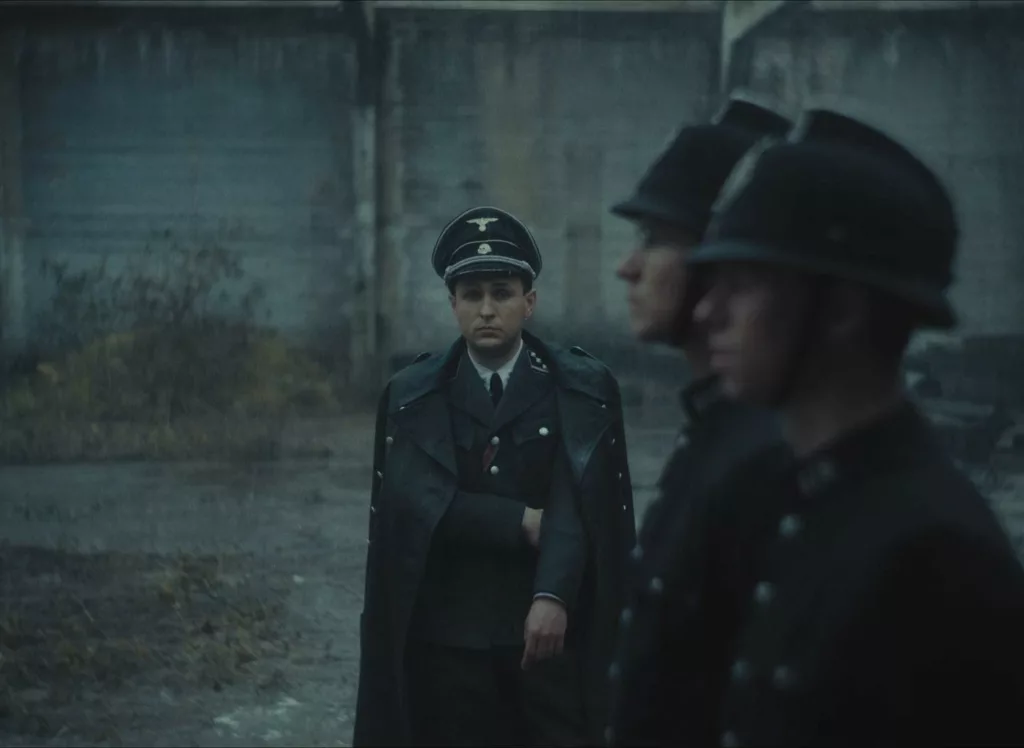Prepare to be transported back to Nazi-occupied Belgium in the gripping new film Wil. Directed by Tim Mielants, this Netflix drama is set in Antwerp during World War II and follows two young policemen who face unimaginable moral dilemmas under the occupation.
Based on the acclaimed novel by Jeroen Olyslaegers, Wil stars Stef Aerts as the title character Wilfried “Wil” Wils, a reluctant police recruit trying to quietly survive the war. But on his very first patrol, Wil witnesses the brutality of the Nazi occupation firsthand when tasked with arresting a Jewish family. After tragedy strikes, Wil struggles between resistance and collaboration, conscience and self-preservation.
With tense cat-and-mouse games between Wil and a ruthless SS officer (Dimitrij Schaad), this nail-biting thriller Wil have you questioning what choices you would make in his shoes. Backed by a talented Belgian cast including Matteo Simoni and Annelore Crollet, Wil pulls no punches in confronting the darkest chapters of human history.
Bleak yet beautifully filmed, this Netflix original promises to be one of the most thought-provoking and challenging films you’ll see this year. Wil dares to ask: how far would you go to survive?
Wrestling with Impossible Choices: Themes and Tone
Bleak barely begins to describe the ominous tone of Wil. This is a film shrouded in darkness – both visually in its shadowy cinematography and thematically as it wrestles with the murky moral quandaries of life under Nazi rule.
At its heart, Wil is an intimate character study about an everyman trapped in impossible situations. As Wilfried “Wil” Wils, our protagonist agonizes over ethical dilemmas where there are no right choices. Turn a blind eye to Nazi brutality or risk your life through defiance? Help the resistance or collaborate to protect your family? At every turn, Wil faces conflicts between resistance and self-preservation, conscience and culpability.
Like the frequent rainstorms drenching its characters, a damp pall of guilt and despair hangs over the film. Wil repeatedly avoids taking a firm stance, seemingly Wiling to compromise his principles if it means staying alive. And yet we sympathize, knowing there are no heroes in such a cruel, paranoid world. It’s this tension – between understanding Wil’s actions yet judging his moral ambivalence – that electrifies the film.
As Tim Mielants steeps us in the everyday madness of occupation, the tone grows more intense and nightmarish. The violence is visceral, the fear palpable. Searing questions emerge about the human capacity for both monstrous evil and quiet complicity. Is Wil a sympathetic victim or a self-serving collaborator? Would we act any differently in his shoes? Like the man himself, the film refuses easy answers.
Haunting Imagery Blankets the Screen
The cinematography of Wil is both beautiful and oppressive, using striking visual compositions to further immerse us in the paranoid reality of Nazi occupation. Shooting in a nearly square 4:3 aspect ratio, cinematographer Robrecht Heyvaert blankets the frame in shadows, the claustrophobic images heightening the tension tenfold.
Faces are routinely obscured, dialogue drowned out by the din of Gramophones – we feel the characters’ isolation and confusion. As Wil navigates his moral labyrinth, the camera floats around him queasily, struggling to find solid ground just as he does. Even rare moments of intimacy between Wil and Yvette feel tense and unstable.
Heyvaert crafts Wil to look like the wartime paintings that first inspired the former artist Wil. The frames are rich with menacing symbolism if we dare to look closer. A dangling lightbulb that keeps blinking on and off. A Leica camera that captures tragedy through its lens. The visual language echoes the film’s questions around seeing and not seeing, action and inaction.
Some may critique the cinematography as more decorative than illuminating. But the striking interplay of light and shadow serves to place us in Wil’s tortured headspace. In Wil’s world, darkness reigns – both ethical and visual.
An Everyman Trapped in Hell: A Character Study of Wil
At the heart of this nightmare is Wil, brought to life in a masterful performance by Stef Aerts. Wil could be any of us – an artist drafted into a job he despises, just trying to avoid trouble as the world burns around him. Thrust into the ethical purgatory of occupation, the well-meaning but morally malleable Wil becomes the axis on which the film’s tension spins.
As Wil witnesses the cruelty and paranoia poisoning his city, we watch him construct a fragile fortress of neutrality to survive. He deflects, avoids, and rationalizes, seemingly Wiling to compromise everything to protect himself and his loved ones. Every confrontation is met with a mask – smiling through gritted teeth or drunk excuses to avoid declaring himself.
Yet we sympathize even in his failings, understanding the paralysis of living under totalitarianism where one misstep means death. There are no saints in Hell; only survivors. While we may judge Wil’s ethical lapses, he remains all too human – just like us.
In navigating Wil’s choices, Aerts displays incredible emotional range, embodying a man trying to silence the warring voices inside him. We see Wil’s anguish as the occupation forces him into deeper moral compromise against those he cares for. As he slips from reluctant bystander to conflicted collaborator, there is a profound pathos to Wil’s erosion of self in his quest to survive.
By the shattering finale where a ruthless SS officer finally closes his trap, we are left to wonder how Wil could have avoided his fate. Was resistance impossible in the face of absolute evil? The genius of the film is that even amid our judgment, part of us relates to Wil’s all too human weakness. There but for the grace of God go we…
Complex Figures Orbiting Wil
While Wil may be the central planet, the supporting characters surrounding him further enrich the moral universe of the film.
As Yvette, Wil’s fiery romantic interest, Annelore Crollet delivers a breakout performance, bringing much-needed warmth to the film’s cold world. We see past her prickly exterior to the young idealist within, moved by her compassion though hampered by naivety. Yvette represents the life Wil might have led if he had Wil enough to take a stand.
Unfortunately, Wil’s police partner Lode receives short shrift despite a compelling actor in Matteo Simoni. Lode disappears for much of the film, rendering Wil’s closest relationship thinly sketched.
No such complaints with Dirk Roofthooft’s chilling turn as Nijdig Baardje, the influential collaborator who patronizes Wil’s artistic ambitions. Jovial yet sinister, Baardje ensnares Wil in a Faustian bargain for protection, demanding only his soul in return. Roofthooft is magnetic as a man delightedly watching Rome burn from his gilded house.
Together these characters orbit Wil in his descent into moral catastrophe, playing off beautifully despite uneven screen time. If only we got to know intriguing figures like Lode more before the credits roll.
Uneven Pacing Undercuts Potential
For all of Wil’s visual brilliance, uneven pacing and editing issues prevent it from fully realizing its potential. In condensing Jeroen Olyslaegers’ acclaimed novel into a two-hour runtime, director Tim Mielants was forced to make difficult cuts. Unfortunately, the resultant pacing problems routinely undermine character development and narrative depth.
Several side characters and relationships vital to understanding Wil’s trajectory suffer from limited screen time. Plot developments meant to escalate tension sometimes feel unconvincing because pivotal transitions occurred off-screen. Even Wil and Yvette’s central romance periodically rings hollow, relying more on carnal chemistry than emotional insight.
By emphasizing tension over depth, Mielants struggles to devote sufficient screen time to explore the rich philosophical questions that his story raises. Lingering restraint holds the film back from ever spiraling into exploitation, but we are left wanting more.
It’s possible a miniseries format may have granted Wil room to breathe, slowing the tempo to fully reckon with the thorny dilemmas of complicity during wartime. Unfortunately, as a film the breakneck pacing prevents us from plumbing the true depths of darkness within Wil…and ourselves.
Timeless Questions, Haunting Parallels
Though set eight decades ago, the questions at the heart of Wil resonate profoundly in today’s world. The film offers a fresh perspective on life under occupation, escaping the simplistic tropes of heroes and villains to carefully examine the painful complexities of morality when society frays.
As Wil navigates ever-grayer scenarios, we gain intimate insight into the mechanics of totalitarianism – how the seeds of complicity and collaboration steadily corrupt individual conscience for “the greater good.” Wil dares to suggest that under the crucible of fascism, most souls would crack trying to reconcile survival and integrity. It’s a harrowing notion with unsettling parallels today.
Ultimately Wil transcends a historical dramatization to become a timeless meditation on the boundaries of ethical compromise – how ordinary people can enable extraordinary evil through passivity and rationalization. We see our own moral hypocrisies sharply reflected back through this bleak but crystalline lens.
The film also challenges viewers in reassuring ourselves that such darkness “could never happen here.” We realize the horrors of World War II weren’t anomalies, but rather latent human capacities exacerbated by groupthink and stoked hatred. Wil confronts us with the terrifying truth that under the right conditions, we all contain the seed of tormentors sleeping within us, waiting to be awakened.
Through Wil’s descent into the heart of darkness, the film distills the Holocaust’s grotesque brutality into a harrowing but essential character study. Wil dares us to look into the abyss of human evil…and see ourselves staring back.
An Unflinching Character Study
For all its imperfections, Wil remains essential viewing – a powerful if deeply disturbing descent into the ethical abyss. Director Tim Mielants has crafted an unflinching character study wrapped in award-worthy cinematography and acting.
By refusing to shy away from the most challenging questions of complicity, Wil establishes itself as a towering drama of ideas. The film resonates long after the credits roll, urging us to interrogate our own moral shortcuts in the name of self-interest. We realize the line between everyday indifference and enabling atrocity is thinner than we’d like to think.
However, uneven pacing prevents Wil from fully realizing the provocative promise of its premise. Just when supporting characters and thematic depth beckon exploration, the film moves on, prioritizing tension over insight.
But these flaws shouldn’t deter viewers from experiencing Wil’s harrowing ride. At its best, Wil mourns the human capacity for rationalization – and by extension, our collective capability to normalize grave injustice through inaction. It’s a disturbing truth we desperately need to confront in these precarious times.
Wil is not an easy film, but for those seeking a white-knuckle morality play offering no easy answers, its unsettling questions Wil haunt you long after the credits.
The Review
Wil
Be prepared to be challenged - Wil pulls no punches in confronting the murkiest depths of human morality under fascism. This raw, masterfully crafted psychological drama lingers uneasily as it pushes us to accept that most souls would compromise themselves and others when survival hangs in the balance. Uneven pacing hamstrings what could have been an all-time great war film. Yet Wil remains essential viewing for those seeking insight into the human conditions that enable injustice through acquiescence. Prepare to see yourself reflected back in this ethical house of mirrors.
PROS
- Powerful moral questions asked about complicity and collaboration
- Incredible central performance by Stef Aerts
- Gorgeous, evocative cinematography
- Nuanced study of impossible ethical dilemmas
- Doesn't provide easy answers
CONS
- Uneven pacing and editing undermine potential
- Some underdeveloped supporting characters
- Plot transitions can feel abrupt or unconvincing
- High tension takes priority over thematic depth
